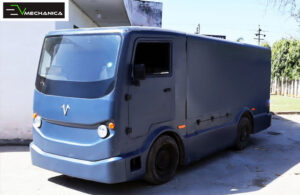 Entry of green mobility has ushered a new phase in the businesses that utilize the daily vehicle for commerce with 100 km per day for long-term economic and environmental sustainability.
Entry of green mobility has ushered a new phase in the businesses that utilize the daily vehicle for commerce with 100 km per day for long-term economic and environmental sustainability.
This fact is especially true for last-mile delivery businesses like e-commerce platforms which are one of the early adopters of electric vehicles.
According to some reports, around 15-20% of last-mile e-commerce cargo fleets have been electrified globally till now and the number is increasing day by day.
This electrification comes either through retrofitted solutions by replacing ICE vehicle parts with EV ones and by the introduction of EVs.
Keeping proactive government policies in consideration, India is now rapidly progressing toward commercial EV fleet usage.
Speaking of electric cargo fleet, the Emergence of EV Fleet in E-Commerce Industry has paved the way for electrifying the last-mile deliveries sector of India.
With e-commerce expected to contribute to 3.5% of the country’s GDP by 2030, EV Fleet in E-Commerce Industry will play a critical role in India’s goal to transition to a more sustainable economy.
100% adoption of EV Fleet in E-Commerce Industry of India can help in avoiding 44% of the total CO2 emissions caused by ICE vehicle counterparts and will also reduce overall consumption of 30 billion litters of fossil fuels per year.
Stressing over the Emergence of EV Fleet in E-Commerce Industry, a new question plaque the minds of experts as to Why Electrification of E-Commerce Fleets is Necessary?
Need for Electrification of E-Commerce Fleet
 Setting aside the sustainability and efficiency aspect of EV Fleet in last-mile delivery, EVs precede ICE vehicles in their perks due to a variety of reasons.
Setting aside the sustainability and efficiency aspect of EV Fleet in last-mile delivery, EVs precede ICE vehicles in their perks due to a variety of reasons.
Firstly, rental and maintenance costs of EV Fleet in E-Commerce Industry like e-scooters, e-bikes, and e-cars are typically less as compared to their conventional counterparts.
On the other hand, electric two-wheelers are adapted to cover shorter distances quickly while not needing overpriced fuel needs like diesel or petrol to keep them functioning.
EV Fleet in E-Commerce Industry allows businesses to leverage the full potential of EVs that have low investments and higher returns in the long run.
Donning another feather in its stride, ICE-based vehicles leave a large carbon footprint and aggravate air pollution when utilized EV Fleets opt for greener mobility to eradicate the possible threats and maintain brand goodwill.
Apart from these perks, cost economics also play a key role in deciding the preference of EVs over ICE ones, once they are commercially utilized.
Government’s Role in Supporting EV Fleet in E-Commerce Industry
 As government offers multiple forms of subsidies and incentives in promoting the electric mobility sector, the inclination of businesses has swayed greatly towards EV Fleet in E-Commerce Industry in terms of commercialized vehicles.
As government offers multiple forms of subsidies and incentives in promoting the electric mobility sector, the inclination of businesses has swayed greatly towards EV Fleet in E-Commerce Industry in terms of commercialized vehicles.
The total cost of ownership (TCO) of EVs is also more feasible for long-traveling vehicles due to its negligible utilization of petrol, diesel, and fewer maintenance costs.
Various central and state policies, incentives, subsidies, and schemes such as Faster Adoption and Manufacturing of Electric Vehicles (FAME I and FAME II), Production Linked Incentive (PLI), and Scrappage policy have also accelerated the growth of EV adoption and played a vital role in the Emergence of EV Fleet in E-Commerce Industry.
Instances of Promoting EV Fleet in E-Commerce Industry
 A striking example of EV Fleet in E-Commerce Industry is the issuance of a new rule described in the Delhi government’s EV policy wherein electric light commercial vehicles belonging to L5N and N1 categories are now allowed to ply on nearly 250 roads in Delhi even during restricted hours and in no-entry zones.
A striking example of EV Fleet in E-Commerce Industry is the issuance of a new rule described in the Delhi government’s EV policy wherein electric light commercial vehicles belonging to L5N and N1 categories are now allowed to ply on nearly 250 roads in Delhi even during restricted hours and in no-entry zones.
This unique proposal is an ultimate initiative by the government to derive a competitive advantage of the EV Fleet in E-Commerce Industry over ICE vehicles.
Delhi government has also revealed its plan to ask e-commerce companies, food delivery services, and cab aggregators to make a complete transition towards EVs, to achieve the goal of attaining a 25% share of EVs in total vehicle sales by 2024.
The government of Maharashtra seeks similar results as they have also proposed online-based businesses like Amazon, Uber, Flipkart, Ola, and other food-delivery companies Zomato and Swiggy to go fully electric.
India’s major automobile business, Tata Motors has also signed an agreement with a variety of e-commerce companies, like Amazon, Big Basket, City Link, DOT, Flipkart, LetsTransport, MoEVing, and Yelo EV to supply EV Fleet in E-Commerce Industry.
The company has also won an order for 39,000 units from these companies for the Ace EV.
In another major instance, Magenta Mobility has joined hands with Amazon India to deploy an EV Fleet in E-Commerce Industry wherein the EV firm will supply two and four-wheeler electric vehicles to Amazon’s delivery partners in Hyderabad.

